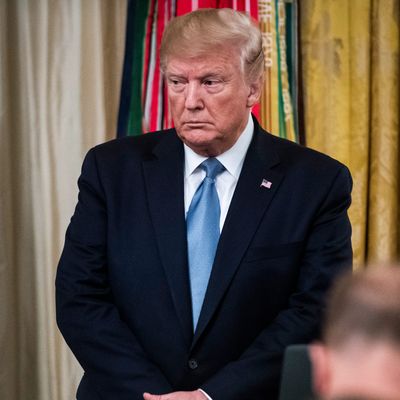
Every day, the vast accumulated evidence that President Trump used American policy toward Ukraine to leverage investigations of his domestic rivals grows even more vast. Republicans are slowly working around to the impossibility of denying the undeniable. They are beginning to coalesce around a more defensible stance: Trump may have screwed up, but he doesn’t deserve removal from office.
National Review’s Jonah Goldberg suggests Trump apologize. His colleague Andrew McCarthy (author of a 2014 book arguing President Obama had committed seven entire categories of impeachable offenses) argues Trump’s misconduct does not rise to the level of an impeachable offense. Republican senators like Tim Scott and Rob Portman are making this argument already.
There could be a reasonable case that Trump’s pressure on Ukraine does not in and of itself merit the extraordinary punishment of removing him from office. Not all crimes require punishment, and sometimes the scalding embarrassment of public exposure itself can serve as a perfectly appropriate punishment. The trouble with this argument is that Trump has not only refused to express any remorse for his offense, he is continuing to commit more of the same crime.
Trump may be denying that he exerted any pressure on Ukraine’s government. But this denial is merely an expression of his reflexive maximalist approach to confrontation, which commits him to automatically denying any anything framed as an accusation, not a backhanded acknowledgement that such pressure would be improper.
Trump has, indeed, maintained all along that he was correct to demand investigations of his enemies. Asked about his demands to Ukraine — after the scandal broke! — he replied, “We’re supporting a country. We want to make sure that country is honest … it’s very important to talk about corruption. If you don’t talk about corruption, why would you give money to a country that you think is corrupt?” Trump uses the word “corrupt” not to describe any actual form of illegal or unethical behavior — Trump is himself a longtime criminal, who has surrounded himself throughout his business and political career with other criminals — but as a way of tagging any figure who opposes him. Robert Mueller, news media he does not control, Adam Schiff, among many others, are all “corrupt.”
Trump has accordingly maintained he has a right to push other countries to investigate any people he considers “corrupt” (i.e., anti-Trump). He has stated this right is absolute. (“As the President of the United States, I have an absolute right, perhaps even a duty, to investigate, or have investigated, CORRUPTION, and that would include asking, or suggesting, other Countries to help us out!”)
Indeed, in keeping with this position, he has openly asked China to investigate the Biden family, while members of his administration keep refusing to deny that they are, right at this moment, incorporating such requests into their negotiations with Beijing. Trump has made it perfectly clear that any foreign country that announces investigations into his domestic enemies will be rewarded with diplomatic favor. Trump’s extraordinary distortion of American foreign policy for political gain is not a one-time offense that he’s learned from and won’t repeat. It is a credo, and an ongoing method.
Trump may learn to hide what he’s doing — his Ukraine plot was so transparent he literally shopped it to the New York Times — but he isn’t going to stop.






























